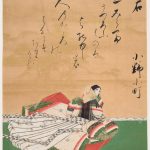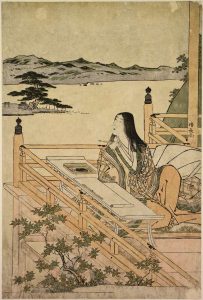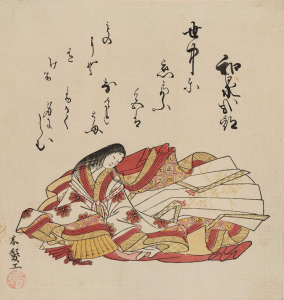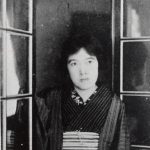Tanka are a form of Japanese poetry that date back more than 1,000 years. Meaning “short song” in Japanese, tanka are 31 on long, written on a single line—an on is similar to a syllable.
Tanka remain very popular in Japan, and these poems have captured every facet of the human experience and the natural world. In the Heian period (794–1185) and the 20th century especially, a number of women stood out as writers of tanka of great beauty, insight, and passion.
We take an in-depth look at tanka and their place in Japanese poetry in a recent online presentation Fireflies Above the Stream on poetry from Kyoto, that you can access here. And in March 2024, we will read tanka, the landmark The Tale of Genji, and contemporary Japense stories on our tour Everyday Beauty: Art and Literature of Japan.
You can read all the tanka discussed during the presentation in this blog post.
Ono no Komachi
花の色はうつりにけりないたづらに わが身世にふるながめせしまに
 The blossom’s tint is washed away
The blossom’s tint is washed away
By heavy showers of rain;
My charms, which once I prized so much,
Are also on the wane, —
Both bloomed, alas! in vain
___________________________________________________
Autumn nights, it seems,
are long by repute alone:
scarcely had we met
when morning’s first light appeared,
leaving everything unsaid.
The autumn night
is long only in name—
We’ve done no more
than gaze at each other
and it’s already dawn
Murasaki Shikibu
 Petals bloom then scatter
Petals bloom then scatter
a sorrowful spring parting
but surely you will come again
to view the flowering capital
– written in response to Genji
“When the spider’s ways this evening gave fair warning that I would soon arrive,
how strange of you to tell me, Come after my garlic days!”
“If I meant enough to you that you came to me each and every night,
why should my garlic days so offend your daintiness?”
from “The Broom Tree” chapter in The Tale of Genji
___________________________________________________
めづらしき光さしそふさか月はもちながらこそ千代もめぐらめ
Rare
The light shining from
The moon upon this wine cup;
In our grasp
Let it circle for a thousand years!
Izumi Shikibu
暗より暗道にぞ入ぬべき遙に照せ山の葉の月
 From darkness
From darkness
On a shadowed path
I must make my way;
Let it faintly shine,
The moon upon the mountain’s edge.
___________________________________________________
今はたゞそよそのことゝ思ひ出でゝ忘る許の憂き事もがな
Now only
Thoughts of it
Fill my mind;
To forget, even more
Pain is what I want!
___________________________________________________
下きゆる雪まの草の珍しくわが思ふ人にあひ見てしがな
Melting from beneath,
The snow opens for the grasses
Rarely
The one I think upon
Would I want to meet.
___________________________________________________
物思へば澤の螢も我身よりあくがれ出づる玉かとぞみる
Reflecting on my life—
the fireflies above the stream
seem to be my yearning soul
wandering free of my body
Yosano Akiko
 Cutting through Gion
Cutting through Gion
on my way to Kiyomizu
in this cherry-blossom moonlight
everyone that I meet
is beautiful!
___________________________________________________
Black hair
Tangled in a thousand strands.
Tangled my hair and
Tangled my tangled memories
Of our long nights of lovemaking.
___________________________________________________
その友はもだえのはてに歌を見ぬわれを召す神きぬ薄黒き
This agony within,
The unknown music;
Finally it’s this, girlfriend,
The God who invites us,
Lightly into darkness.
Travel with Classical Pursuits to Japan in March 2024 to explore classical and contemporary Japanese poetry and art in Kyoto. For more information, contact Ivan at ivan@worldwidequest.com.
Sources for poems by Ono no Komachi: https://lostfoundintrans.wordpress.com/2014/02/13/hyakunin-isshu-no-9/; https://briefpoems.wordpress.com/2020/05/02/watching-rain-brief-poems-by-ono-no-komachi/; translations by William Porter, Helen Craig McCullough, and Jane Hirshfield and Mariko Arantani
Sources for poems by Izumi Shikibu: https://www.wakapoetry.net, numbers SIS XX: 1342; GSIS X: 573; GSIS XI: 635, translated by Thomas McAuley; Tokyo Literary Guide, ed. Dougill et al, Camphor Press, 2020
Sources for poems by Murasaki Shikibu: Tokyo Literary Guide; The Tale of Genji, translated Royall Tyler, Penguin, 2006
Sources for poems by Yosano Akiko:Tokyo Literary Guide; https://briefpoems.wordpress.com/2017/03/21/tangled-hair-some-tanka-by-yosano-akiko/, translated by Kenneth Rexroth; https://www.asymptotejournal.com/poetry/yosano-akiko-five-poems/, translated Stephen Cahaly

Thanks for bringing this form of poetry to us, Melanie! I had known of haiku, but not tanka until your webinar about it. This form of poetry is quite interesting and beautiful in its expressions.